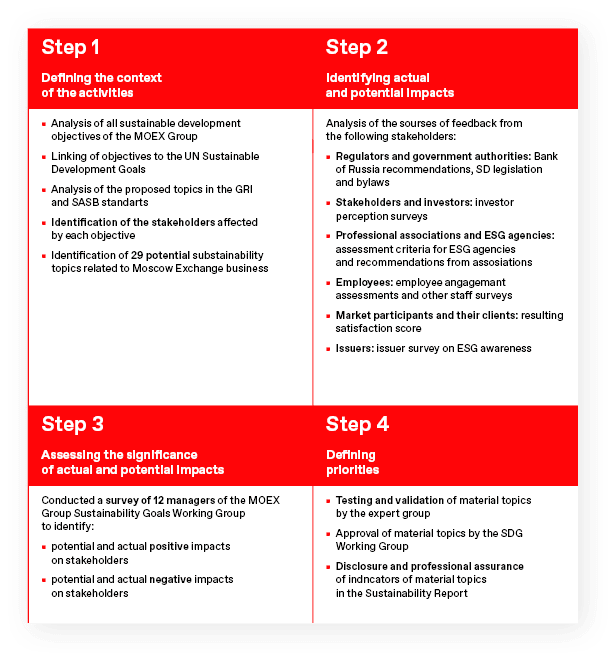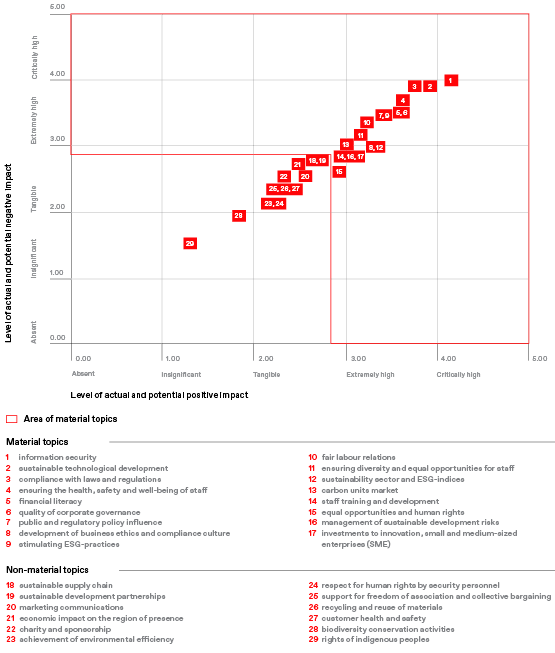MOEX GROUP’S APPROACH TO MATERIALITY
3-1 3-2 2-14
Determining material topics for the Report is an essential part of preparing non-financial statements as per the GRI Standards. The purpose of this procedure is to study and identify the economic, environmental, and social issues that are most impacted by Moscow Exchange on its stakeholders.
The new GRI standards that came into force required a new prioritisation of material topics based on a combination of negative and positive impacts on stakeholders. The Moscow Exchange Group Sustainable Development Goals Working Group (SDG WG), formed by the Executive Board’s decision dated 16 November 2021 (Minutes No. 84), conducted a four-step procedure to identify material topics.

The list of analysed topics was expanded from 16 in the 2020 The matrix and the list of material topics for the last reporting period may be found in Sustainability Report of Moscow Exchange 2021: https://fs.moex.com/files/24514/. analysis to 29 topics; of these, 17 were recognised as material based on the stakeholder impact criterion. Based on the results of prioritisation, the list of material sustainability topics was approved by a decision of the Moscow Exchange Executive Board dated 25 April 2023 (Minutes No. 29).
New substantive topics have been converted into 22 objectives of the 2023 Sustainability Roadmap.
- The new GRI Standards (2021) require to distinguish the sustainability topics by the significance of actual and potential, negative and positive impacts on the stakeholders.
- The integral rating of the material topic is calculated as the sum of the levels of positive and negative impact on the stakeholders.
- All of the material topics with an integral impact rating above 5.5 are rated as material.
- Indicators of non-material topics may be disclosed in the sustainability report but are not covered by professional assurance.

Impact ratingThe integral rating of a material topic is calculated as the sum of the levels of positive and negative impact on stakeholders. | Topic name | Impacted stakeholders | GRI and SASB standards |
|---|---|---|---|
8.58 | 1. Information security | Market participants and their clients | GRI 418 : Customer Privacy (2016) FN-EX-550a.2 |
7.92 | 2. Sustainable technological development | Market participants and their clients Moscow Exchange shareholders and investors | FN-EX-410a.1 FN-EX-550a.1 FN-EX-000.A FN-EX-000.B |
7.75 | 3. Compliance with laws and regulations | Regulators and state authorities (Bank of Russia, Federal Executive and Legislative Bodies) | |
7.17 | 4. Ensuring the health, safety and well-being of staff | Employees | GRI 403 : Professional Health and Safety (2018) |
7.17 | 5. Financial literacy | Market participants and their clients Residents of the region of presence | GRI 413 : Local Communities (2016) GRI 203 : Indirect Economic Impacts (2016) |
7.08 | 6. Quality of corporate governance | Moscow Exchange shareholders and investors | |
6.67 | 7. Public and regulator policy influence | Regulators and state authorities (Bank of Russia, Federal Executive and Legislative Bodies) Professional Associations and ESG-Agencies Development institutions and International Organisations | GRI 415 : Public Policy (2016) |
6.58 | 8. Development of business ethics and compliance culture | Employees | GRI 205 : Anti-corruption (2016) GRI 206 : Anti-competitive Behavior (2016) FN-EX-510a.1 |
6.33 | 9. Stimulating ESG-practices | Issuers Professional Associations and ESG-Agencies | GRI 203 : Indirect Economic Impacts (2016) FN-EX-410a.3 FN-EX-410a.4 FN-EX-510a.1 |
6.33 | 10. Fair labour relations | Employees | GRI 401 : Employment (2016) GRI 402 : Labour Management Relations (2016) |
6.17 | 11. Ensuring diversity and equal opportunities for staff | Employees | GRI 405 : Diversity and Equal Opportunity (2016) GRI 406 : Non-discrimination (2016) |
6.17 | 12. Sustainability sector and ESG-indices | Issuers Market participants and their clients | GRI 203 : Indirect Economic Impacts (2016) |
5.92 | 13. Carbon units market | Issuers Market participants and their clients Regulators and state authorities (Bank of Russia, Federal Executive and Legislative Bodies) Development institutions and International Organisations | GRI 203 : Indirect Economic Impacts (2016) |
5.83 | 14. Staff training and development | Employees | GRI 404 : Training and Education (2016) |
5.83 | 15. Equal opportunities and human rights | Issuers Employees | GRI 408 : Child Labour (2016) GRI 409 : Forced or Compulsory Labour (2016) |
5.83 | 16. Management of sustainable development risks | Moscow Exchange shareholders and investors | GRI 201 : Economic Performance (2016) |
5.75 | 17. Investments to Innovation, small and medium-sized enterprises | Issuers Development institutions and International Organisations | GRI 203 : Indirect Economic Impacts (2016) |
Other material topics that can be disclosed selectively | |||
5.25 | 18. Sustainable supply chain | Suppliers and contractors | GRI 308 : Supplier Environmental Assessment (2016) GRI 414 : Supplier Social Assessment (2016) |
5.25 | 19. Sustainable development partnerships | Professional Associations and ESG-Agencies Development institutions and International Organisations | |
5.00 | 21. Economic impact on the region of presence | Residents of the region of presence Regulators and state authorities (Bank of Russia, Federal Executive and Legislative Bodies) | GRI 201 : Economic Performance (2016) GRI 202 : Market Presence (2016) GRI 207 : Tax (2019) |
4.75 | 22. Charity and sponsorship | Residents of the region of presence | GRI 203 : Indirect Economic Impacts (2016) |
4.50 | 23. Achievement of environmental efficiency | Residents of the region of presence | GRI 302 : Energy (2016) GRI 303 : Water and Effluents (2018) GRI 305 : Emissions (2016) GRI 306 : Waste (2020) |
4.42 | 25. Support for freedom of association and collective bargaining | Employees | GRI 407 : Freedom of Associations and Collective Bargaining (2016) |
4.42 | 26. Recycling and reuse of materials | Residents of the region of presence | |
3.83 | 28. Biodiversity conservation activities | Residents of the region of presence Professional Associations and ESG-Agencies | GRI 304 : Biodiversity (2016) |
